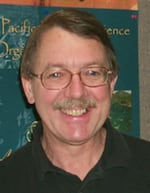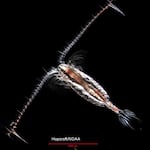
Oceanographer Bill Peterson.
NOAA Fisheries
A renowned Oregon ocean scientist has died. Bill Peterson, 74, helped illuminate how climate events like the El Niño affect the ocean food web, including the Northwest's salmon runs.
Peterson spent much of his career working for the research arm of NOAA Fisheries, the federal ocean science agency, at the Northwest Fisheries Science Center field station in Newport.
“He had such a contagious genuine enthusiasm for his work,” said Cisco Werner, Chief Science Advisor of NOAA's National Marine Fisheries Service. "Because of Bill, we understand the oceans better."

A copepod, one of the main types of plankton Bill Peterson studied.
For more than 20 years, Peterson visited the same stretch of ocean 25 miles off the coast near Newport, and collected data on the species at the bottom of the ocean food web: a wide variety of plankton and krill.
"He knew them like birders know birds," said Michael Milstein, West Coast spokesman for NOAA Fisheries.
Peterson noticed that in some years, the zooplankton he studied came from the north and had more fat.
Those fatty northern zooplankton added more energy to the food web, which in turn meant better survival for young salmon maturing in the ocean. In other years, leaner zooplankton from the south dominated the waters off the Oregon coast, which corresponded to trouble for upcoming salmon runs.
"He really helped define the base of the food web in a way that then we could translate into understanding how we manage our fisheries," Werner said.
In recent years, Peterson's many years of observations of the Oregon coast helped shed light on a unusual phenomenon: A mass of warm water, known as the blob, that stretched from California to Alaska. The blob lingered from 2013 to 2016, years where unusual numbers of whales, seals and seabirds appeared to starve to death.
During those years, Peterson's team in Newport reported finding tropical and subtropical species of plankton off the coast.
"For someone of Bill's caliber, to say that he's never seen some of the species that he observed, really amplified the importance and the uniqueness of the warm blob," says Werner. "We were able to say how significant it was."
Peterson died after battling cancer. His colleagues say his ashes will be scattered 25 miles off the coast near Newport, in the same stretch of ocean he returned to every month for his research.
Before moving to Oregon, Peterson worked in Monterey, California with the National Ocean Service. Other areas where he has worked include the University of Cape Town in South Africa, the Sea Fisheries Research Institute and as an assistant professor at the State University of New York at Stony Brook on Long Island, NY.
